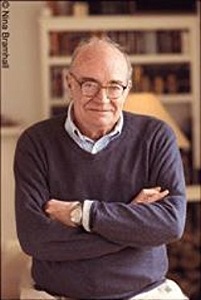De Amerikaanse schrijver Ward S. Just werd geboren op 5 september 1935 in Michigan City, Indiana. Just bezocht de Lake Forest Academy en vervolgens studeerde hij af aan de Cranbrook School in 1953. Ook bezocht hij kort Trinity College in Hartford, Connecticut. Hij begon zijn carrière als journalist voor de Waukegan (Illinois) News-Sun. Hij was ook correspondent voor Newsweek en The Washington Post in de periode 1959-1969, waarna hij de journalistiek verwaal zei om fictie te schrijven. Beïnvloed werd hij onder andere door Henry James en Ernest Hemingway. Zijn roman “An Unfinished Season” was finalist voor de Pulitzer Prize voor fictie in 2005. Zijn roman “Echo House” was finalist voor de National Book Award in 1997. Hij is twee keer finalist voor de O. Henry Award geweest: in 1985 voor zijn korte verhaal “About Boston”, en opnieuw in 1986 voor zijn korte verhaal “The Costa Brava” in 1959. In zijn fictie houdt hij zich vaak bezig met de invloed van de nationale politiek op de persoonlijke levens van Amerikanen. Ward S. Just schreef 17 romans en talrijke korte verhalen.
Uit: Rodin’s Debutante
„This is a true story, or true as far as it goes. OgdenHall School for Boys never would have existed were itnot for the journey that two Chicago girls made to Pariswith their mother. The eldest girl had her head sculpted in mar-ble by the great Rodin in his atelier at the Dépôt desMarbres,a bust from his own hand and chisel. The Chicago girl waseighteen and lovely, the bust a present on her birthday. Rodinwas demanding, meticulous in his craft. His eyes glittered as heworked, his unruly head moving to some mysterious rhythm.The girl was a little bit afraid of Rodin, his glare almost preda-tory, his eyes black as lumps of coal. And when she mentionedthis to her mother, the woman only smiled and said that suchmen were forces of nature but that did not mean they could notbe tamed. Only one question: Was the taming worth the trouble?This Rodin, probably yes; but it would take time to fi nd out. Thefi nding-out would be the amusing part and naturally there wasambiguity as in any sentimental endeavor. Taming had its unfor-tunate side.In any case, the girl’s mother said, you are much too young forsuch an adventure. Wait two years.The sitting took only a few days – Rodin wanted an addi-tional day but that was out of the question owing to the travelschedule – and then the girls went on to Salzburg. Their mother was devoted to German opera. Then east to Vienna, south toFlorence, and west to Nice, and when, one month later, they re-turned to Paris the bust was done and in due course sent by shipand installed in the hallway alcove of the Astor Street house, abeautiful work of art, most soulful, luminous in the yellow lightfrom the new electric lamps, and a trenchant counterpoint to thesoft Cézanne landscape on the wall opposite. All the newspaperstook notice. The Art Institute took particular notice, though thecurator privately thought that the bust showed signs of haste.Rodin’s debutante was the talk of Chicago. The cost was tri-fl ing, a bagatelle. Mother paid francs, cash, on the spot. Twohusky workmen were required to transport the wooden case tothe brougham waiting at curbside.
That was marie’s point, made again and again to herhusband Tommy, who was unimpressed, sawing away at his beef-steak, his head low to the plate. Who knew if he was even listen-ing. Tommy Ogden, irascible at all times, disliked discussion of money at meals. The price, Marie went on, was barely more thana wretched automobile, one of Ford’s small ones, a mere pieceof machinery as opposed to a work of art that would endureforever and ever. The argument began at cocktails, continuedthrough dinner, and did not end – well, in a sense it never ended. There were witnesses to it, the van Hornes and their daughter Trish and the Billingtons and Tommy’s lawyer Bert Marks andthe Italian servants, Francesca and Alana.°

Ward S. Just (Michigan City, 5 september 1935)
